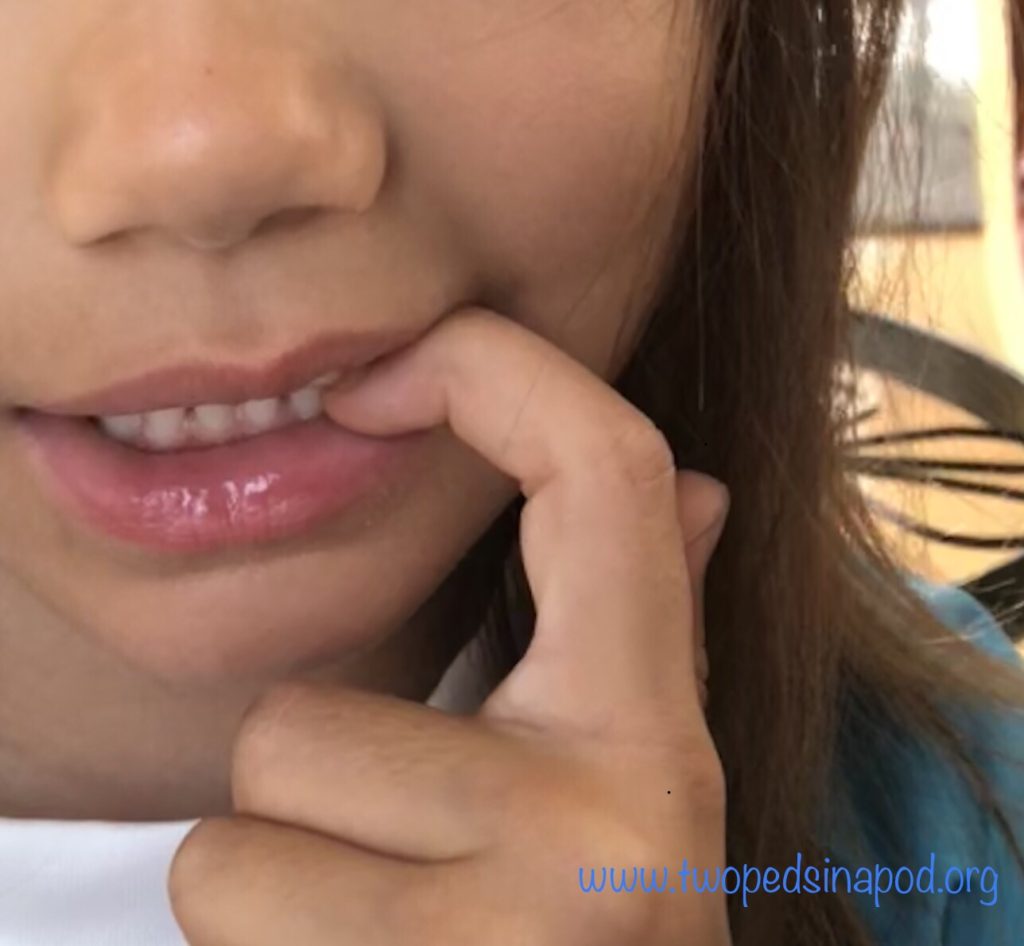How to stop nail biting-thoughts to chew on

A preschooler nibbles on her nails.
Stop nail biting! One of our readers wrote to us: “My 3.5-year-old daughter has started biting her nails to the quick. She does have a new little sister so perhaps it is stress/anxiety about that, but I don’t know what to do. Do I ignore it? Offer rewards for not biting? Please help – the habit drives me nuts and her poor little fingers are looking worse for the wear (and painful).”
As many of you have likely already discovered, telling your kid, or pleading with them, or bribing, ignoring, or yelling at them, will not help your kids stop nail biting.
Nail biting is a common childhood habit. Really common. In fact, according to this review article from 2015, it is THE most common habit seen in school-aged and college-aged kids. As many as 60% of kids, at some point, bite their nails. Nail biting usually starts between the ages of three to six years, so our reader’s child is right on target for this habit.
I am amused that many of the parents who ask me how to help their kids stop biting their nails are, themselves, nail biters. I will point out that even if we can’t stop nail biting, the concerned parent is a living example of a nail biter who still grows into a successful adult.
Assuming that your child is otherwise acting well, eating and sleeping normally, and mostly cheerful, it is not always important to identify the trigger of nail biting. More importantly, make sure your child washes their hands after playing outside and before eating (and nail biting) to limit germ spread. Check their fingers for signs of infections that can result from nail biting.
What to do
A quick internet search reveals dozens of products that you can dab onto your child’s fingers to discourage nail biting. Products with nasty tasting ingredients such as “bitter apple” tote promises such as “stop nail biting instantly.” Unfortunately, most nail biters are not deterred by paint-on products.
Usually kids have a hard time breaking a habit unless they REALLY want to break it themselves. Here are some suggestions to help:
- Offer painting nails or small rewards for not biting nails.
- Don’t be a nag.
- Establish a code word for stop biting your nails that only your child knows. The word can be a nonsense word (e.g. oogleschmertz) or a word entirely out of context (e.g. elephant). For younger kids especially, this creates an environment of humor, rather than annoyance when you are reminding them to stop biting.
- Substitute a less annoying habit for nail biting. Hand them something to keep their hands busy. Give them a squishy toy to squish or a hair scrunchy to wear on their wrist to flick.
- Offer older kids sugarless chewing gum to keep their teeth busy.
If all else fails, take heart in one study that came out in favor of nail biting (and thumb sucking). Perhaps it’s not imperative to stop nail biting after all. The study showed that nail biters and thumb suckers had a lower rate of atopic sensitization (medical term for allergic eczema) than their non-nail biting or thumb sucking peers. The researchers conclude “Although we do not suggest that children should be encouraged to take up these oral habits, the findings suggest that thumb sucking and nail biting reduce the risk for developing sensitization to common aeroallergens.” In other words, the nail biters show fewer allergy symptoms in their skin than the non-nail biters.
Let’s face it: We all are creatures of habit. The key is to make sure the habit is not self-detrimental. Every childhood habit does not need to be broken immediately, even if it drives us parents crazy.
Julie Kardos, MD and Naline Lai, MD
© 2018 Two Peds in a Pod®